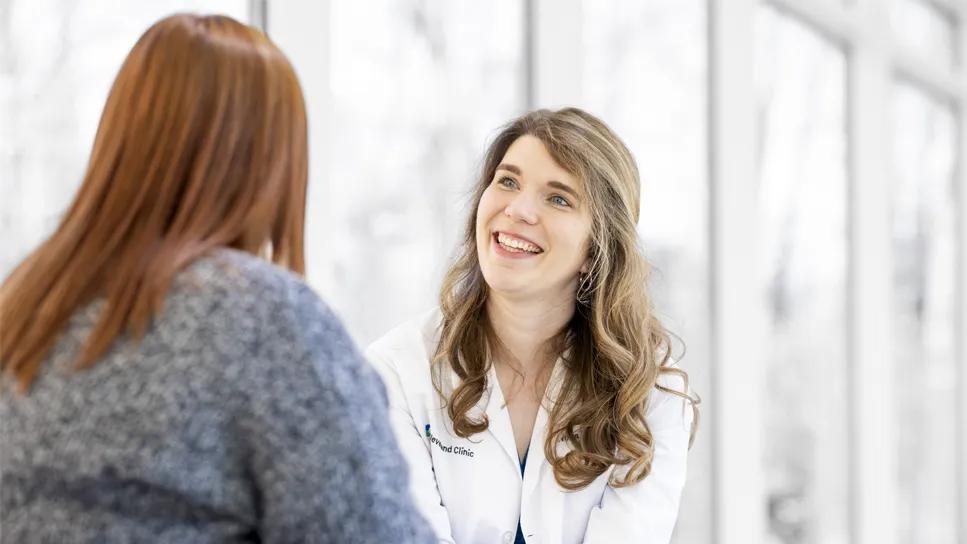Specialized course helps APPs navigate clinical concerns and interpersonal skills

Image content: This image is available to view online.
View image online (https://assets.clevelandclinic.org/transform/733e1077-8b0c-434f-bdc6-1866373b7258/app-psychiatry-skills-course)
APP talking with patient
Although advanced practice providers (APPs) play an expanding role in consultation-liaison psychiatry, they face a shortage of standardized training and educational resources. A new skills course developed by the Academy of Consultation-Liaison Psychiatry (ACLP) is now filling that gap.
Advertisement
Cleveland Clinic is a non-profit academic medical center. Advertising on our site helps support our mission. We do not endorse non-Cleveland Clinic products or services. Policy
The course, which was first offered at the organization's 2023 annual meeting, includes didactic learning as well as interactive case discussions and covers topics like delirium and the management of agitation, addictions in the consultation-liaison setting, and functional neurological disorders, as well as soft skills like communication and relationship building.
The course represents a larger effort by ACLP to expand and include more APPs, says Cleveland Clinic psychiatrist Molly Howland, MD, who chairs the academy’s Interprofessional Education Subcommittee.
“APPs, especially nurse practitioners, comprise a substantial percentage of consultation-liaison psychiatry teams,” she explains. “With the skills course, the ACLP aims to become a potential professional home for APPs, so they can keep coming back for educational resources and get the support they need to succeed on the job.”
To develop the course's content and format, the subcommittee worked with an advisory group that included nurse practitioners, physician associates and clinical nurse specialists. The group also conducted a needs assessment survey to learn more about the topics APPs wanted to see covered.
The survey revealed that approximately 80% of those who took the first course said they would recommend it to colleagues. About 72% of participants were nurse practitioners; others included PAs, attending physicians and trainees.
After the first course, organizers added nuanced topics, including psycho-oncology, and also focused more on issues like communication, liaising with the psychiatry team and providing psychoeducation, Dr. Howland says.
Advertisement
“Based on the feedback we received, people seemed particularly interested in learning more about soft skills,” she says.
One topic addressed in last year’s course was how APPs can respond to subtle, disrespectful behaviors or comments they encounter during their practice. Howland notes that the expanding role of APPs in the consultation-liaison psychiatry field has sometimes led to friction with physicians and other providers, who may respond by questioning the provider’s training, challenging their authority or making dismissive remarks.
The 2024 course offered tools and techniques designed to help APPs navigate these relationships, including a mnemonic device to help them remember how to respond in the moment.
Dr. Howland, who has an interest in clinical education, says it has been rewarding to work on the course.
“I love being able to think about how we can reach people with different professional backgrounds, to give them the knowledge they want and need, and to present the information in a way that engages and inspires them,” she says.
Dr. Howland hopes to encourage other providers to enroll in this year’s course and engage with the ACLP to access further resources and support. She adds that the ACLP is planning to create additional programs for APPs, including mentoring and special interest groups.
“In particular, we’re looking for seasoned APPs who can be leaders within the academy and provide mentorship to people who are just transitioning to consultation-liaison psychiatry and might need support,” she says.
Advertisement
In the near future, Dr. Howland and her team hope to open the curriculum to more in-depth psychotherapy, interdisciplinary skills training and networking.
Dr. Howland wrote about the program in an educational case report, “Developing an Advanced Practice Provider Skills Course in Consultation-Liaison Psychiatry,” published in Academic Psychiatry.
Advertisement
Advertisement
Interdisciplinary program fosters high-performance teams
1:1 guidance benefits individuals and organization
Strategies for building connections, staying present
Development leader harnesses shared purpose to fuel meaningful giving
Expert tips from Cleveland Clinic’s Chief Legal Officer
Dedicated leader shares her passion for quality, education and professional development
Groups move the metrics in environmental services and sterile processing
Certified coaches help hospital teams build trust, improve communication